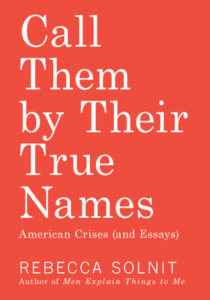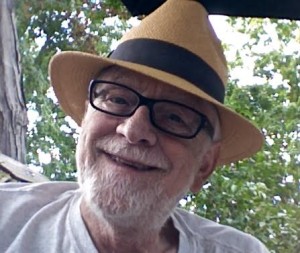By Robert Thomas
Subtitled American Crises (and Essays), Call Them by Their True Names is Rebecca Solnit’s powerful 2018 collection of timely essays. The book’s forward, “Politics and the American Language,” sets the author’s course in sifting the wheat from the chaff that is the contemporary Babel of linguistic chicanery.
“Calling things by their true names is the work I have tried to do in the essays here,” she asserts.
Solnit’s methodology in the 18 essays is a righteous calling-out, based on diagnosis and analysis. Her very accessible writing style, driven by the clarity and passionate rhythms of her words, offers an agile melding of literary genre with logic and common sense. Her naming and calling out is a delight that resounds with the critical nature of poetry, journalism, art, politics and philosophy.

The book is organized around four major themes: Electoral Catastrophes, American Emotions, American Edges, and Possibilities.
Electoral Catastrophes plunges immediately into the naming fray. The opening essay is a rocking readerly ride in the form of a traditional moral fable well-told. “The Loneliness of Donald Trump (2017)” is driven by the clarity and rhythm of the words.
Reading this fairy tale aloud further demonstrates the rhythmic nature of Solnit’s word composition, words that confront the nonsensical Babelistic word salad of nihilistic dividers and destroyers, not unlike an ancient prophet preaching clarity over deceitful obfuscation.
“Milestones in Misogyny (2016)” examines the ubiquity of meanness in the land as evidenced by the pillory of Hillary Clinton and the repeated chants of “Lock her up!” Solnit returns to literature to name, diagnose, and analyze the screech of Caucasian grievance.
“I had seen all around me,” she writes, “a mob mentality, an irrational groupthink that fed on itself, confirmed itself, and punished doubt, opposition, or complexity. Solnit says she thought of the “two-minute group hate sessions” in George Orwell’s 1984:
“The horrible thing about the Two Minutes Hate was not that one was obliged to act a part, but that it was impossible to avoid joining in. Within thirty seconds any pretense was always unnecessary. A hideous ecstasy of fear and vindictiveness, a desire to kill, to torture, to smash faces in with a sledge hammer, seemed to flow through the whole group of people like an electric current, turning one even against one’s will into a grimacing, screaming lunatic. And yet the rage that one felt was an abstract, undirected emotion which could be switched from one object to another like the flame of a bowl lamp.”
Rounding out the Electoral Catastrophes theme, “Twenty Million Missing Storytellers” references the estimated eligible voters who could not vote due to voter suppression laws and gerrymandering practices, and the Supreme Court ruling that gutted the Voting Rights Act in 2013.
Solnit muses: “Imagine that those 20 million votes were not suppressed, that voting was made easily accessible and encouraged, rather than the opposite. The party of white grievance would be defunct or unrecognizably different from what it is today. But the Democratic Party would be different, too. Imagine that the Democratic Party had to answer to more young people, more poor people, more nonwhite people, more people who believe in strengthening human rights and social service.”
Such imagining calls for telling a new story. “We can’t undo what has been,” she concludes. “The story has been told, the line has been walked. But we can correct course. We can start by telling a story that millions of missing voters matter and by working to get those voters back in the game.”
The American Emotions theme opens with naming and diagnosing of “The Ideology of Isolation (2016)”:
“If you boil the strange soup of contemporary right wing ideology down to a sort of bouillon cube, you find the idea that things are not connected to other things, that people are not connected to other people, and that they are all better off unconnected. The core values are individual freedom and individual responsibility: yourself for yourself, on your own. Out of this glorious disconnect comes all sorts of illogical thinking. Taken to its conclusion, this worldview dictates that even facts are freestanding items that the self-made man can manufacture for use as he sees fit.”
Solnit counters with several effective examples of the reality of universal connectivity, my favorite being the naturalist John Muir: “When we try to pick out anything by itself, we find it hitched to everything else in the universe.” The Universe operates as a cooperative system versus the skewed Darwinian evolutionary perversion that proclaims the dog-eat-dog version of evolutionary development. The author names contributing isolationist delusions with her diagnosis and analysis of “Naive Cynicism (2016),” which she posits as “loving itself more than the world; it defends itself in lieu of defending the world.”
She offers a Kenny Rodgers song, “Coward of the County,” as a template for “Facing the Furies (2017),” — diagnosing and analyzing the furies of rage as an affirmation of the self and one’s virility and its underlying insecurities.
“Preaching to the Choir (2017) is a paean to human wholesomeness, the connectivity of humanity. “We cannot walk alone,” Solnit advises, “In finding people to walk with—and talk with—we find power as well as pleasure.”
The American Edges section of the book unveils a major elephant in the realms of civic discourse: violence.“Climate Change is Violence” exposes origins of such violence. “When we talk of violence,” Solnit asserts, “we almost always talk about violence from below, not above. Or so I thought, when I received a press release from a climate group announcing scientists say there is a direct link between changing climate and an increase of violence.’”
The author’s perspective and methodology come into full display with her naming, diagnosing, and analyzing contemporary hierarchies of American violence. In five pages, Solnit”s words float like a butterfly and stings like a bee in her naming of the scope and origins of the roots of violence.
“In every arena,” she cautions, “we need to look at the top elevations of culpability and accountability for the roots of industrial-scale and systemic violence at global levels of command and control and culpability.”
“Climate change,” Solnit states, “is global scale violence, against places and living species as well as human beings. Once we call it by its true name, we can start having a real conversation about our priorities and values. Because the revolt against brutality begins with a revolt against the language that hides that brutality.”
“Death by Gentrification — The Killing of Alex Nieto and the Savaging of San Francisco” merges the story of a police assassination of an innocent resident with the demise of a fine American city.
“San Francisco is now a cruel place and a divided one,” states Solnit after her calling-out of the human causes of such global destruction. She best exemplifies the new inhabitants of San Francisco via an open letter to the mayor posted on the Internet in February 2016 by Justin Keller, founder of a not very successful startup.
She says Keller’s letter is typical in its tone: ” ‘I know people are frustrated about gentrification happening in the city, but the reality is, we live in a free market society. The wealthy working people have earned their right to live in the city. They went out, got an education, work hard, and earned it. I shouldn”t have to worry about being accosted. I shouldn”t have to see the pain, struggle, and despair of homeless people to and from my way to work every day.’ ”
Solnit, who covered the trial about the death of Alex Nieto as a journalist and resident of San Francisco, offers some hope, some resurrectional uplift, by reminding that “The death of Alex Nieto is a story of one young man torn apart by bullets, and of a community coming together to remember him. They pursued more than justice, as the case became a cause, as the expressions became an artistic outpouring in video, posters, and memorials, and as friendships and alliances were forged and strengthened.”
In spite of her fondest hopes, Solnit offers the caution of the realist: “But many forces threaten that togetherness,” she writes.
For me, once a 40-year resident of San Francisco, I found the author’s blending of Nieto’s assassination at the hands of the SFPD with the death of San Francisco at the hands of economic gentrification/development to be a brilliant naming, diagnosis and analysis of my favorite city’s demise.
But the profile of Jasper Masters on death row portrays the essence of humanity in the worst of times. I was reminded of Viktor Frankl’s existential enlightenment about the essence of freedom and its responsibilities while in a Nazi concentration camp. “Eight Million Ways to Belong” is a letter to Trump Solnit wrote on Oct. 20, 2016. I found its humane voicing a refreshing call-out. “The Light from Standing Rock” demonstrates the dangers and the hopes of humanity.
Solnit wraps up the American Edge collection of essays with a warning and a hope: “We are facing a lot of trouble on all fronts. Standing Rock reminds us to come together and stand up to it.”
The author’s final section of essays, “Possibilities,” opens with “Break the Story,” a revised commencement address to Solnit’s alma mater, the Graduate School of Journalism at the University of California, Berkeley. It is an exceptional nine-page meditation on the arts and responsibilities of storytelling and journalism. Exemplifying the hopeful human factor, always present in Solnit”s storytelling, “Hope in Grief” concludes:
“The sorrow and fury, the sleeplessness and indignation, are not in themselves powers, but they testify to a public-spirited population that may be able to take back a country stolen by a corrupted election and unpunished violations of law. And the moment may soon come when we must try.”
“In Praise of Indirect Consequences,” Solnit concludes her collection of powerful meditations with hopeful notes. “I began talking about hope in 2003, in the bleak days after the war in Iraq was launched. Fifteen years later, I still use the term because it navigates a way forward between the false certainties of optimism and pessimism, and the complacency or passivity that goes with both…. “Hope for me has meant a sense that the future is unpredictable, and that we don”t actually know what will happen, but know that we may be able to write it ourselves.
“Hope is a belief that what we do might matter, an understanding that the future is not yet written. It’s an informed, astute open mindedness about what can happen and what role we might play in it. Hope looks forward but draws its energies from the past, from knowing history, including our victories, and their complexities and imperfections. It means not fetishizing the perfect that is the enemy of the good, not snatching defeat from the jaws of victory, not assuming you know what will happen when the future is unwritten, and part of what happens is up to us.”
Call Them by Their True Names is an illuminating collection of meditations on where we are as a people and what we aspire to be.
Banner photo: Mural, by P.J. Dakota, on the west exterior wall of Totem Bookstore and Cafe located at 620 W. Court Street in Flint.

Voracious reader and EVM book reviewer Robert Thomas, formerly a priest in Michigan and for decades a cable-car driver in San Francisco, returned to Flint in 2005 and is a former EVM board member.



You must be logged in to post a comment.